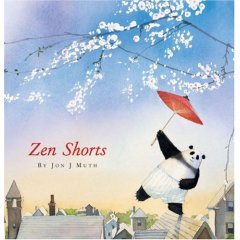MICHAEL! There's a bear outside!" said Karl.
"A what?" called Michael.
"A bear. He's really big. And he's in the backyard."
"What's he doing?" Michael asked.
"He's sitting."
 If you ever wished you had a gentle yet fun way to introduce your family to Zen, look no further than a beautiful children's book: Jon J. Muth's Zen Shorts. Three young siblings meet their new neighbor, Stillwater - a giant panda. Each child interacts with Stillwater who, in turn, helps them each learn a priceless lesson through age-old Zen stories.
If you ever wished you had a gentle yet fun way to introduce your family to Zen, look no further than a beautiful children's book: Jon J. Muth's Zen Shorts. Three young siblings meet their new neighbor, Stillwater - a giant panda. Each child interacts with Stillwater who, in turn, helps them each learn a priceless lesson through age-old Zen stories.
This book touches both the child and adult reader on different levels. Younger children will delight in Muth's charming (and decidedly Zen-like) watercolor illustrations. Older children will enjoy the vivid storytelling and Stillwater's fascinating responses to each of the siblings' situations. Adults will recognize familiar Zen parables and perhaps discover insight from a new perspective. People of all ages will also recognize humor in the illustrations, including the shorts that Stillwater wears (a play on the title "Zen Shorts"), as well as Zen fundamentals, such as Stillwater sharing tea with Karl.
This book is one that should definitely be read aloud. Not only is the story engaging, but in true Zen tradition, Stillwater presents each story without any explanation. Instead, he leaves each child (and reader) to draw his or her own conclusion. Included are three parables: the story of the robber and the monk who wanted to give him the moon, the story of the farmer's luck (from Taoist tradition), and the story of the two monks crossing the river. Underlying aspects that are introduced in a more subtle way include generosity, compassion, and forgiveness - have you ever given presents on your birthday instead of received them? It's a perfect way to engage your family and spark conversations about Zen practice and spirituality. Indeed, the book answers many questions, but it also leads to many more!
At the end of the book, Muth includes a brief introduction to Zen and meditation practice. He also explains the source of the parables within the book as well as the origin of Stillwater's name.
Cleverly disguised as a children's book, this gem is really one for anybody who has ever had a question about "what is Zen." As simplistic as it sounds, this book is an excellent signpost toward the path. It is no wonder that this book was awarded the Caldecott Honor.
